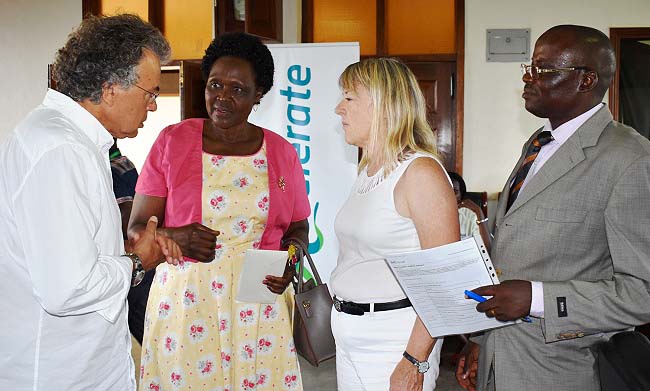Makerere University’s College of Agricultural and Environmental Sciences (CAES) together with partners under the ACCELERATE Initiative have held a one day workshop and round-table conversation on Youth, Education and Innovation in development of sustainable Agribusiness.
The workshop was opened by the Deputy Director Directorate of Research and Graduate Training (DRGT) in charge of Administration Dr. David Owiny at the Makerere University Senate building on Friday, 17th August 2018.
ACCELERATE is a multi-stakeholder partnership for innovation, co-creation and enabling youth to build sustainable agribusiness informed by evidence-based research and with a global presence.

The aim of the workshop was to initiate Public-Private Partnerships for blended learning, which should identify the causes, consequences and expected responses for improving the capacity and competitiveness of the youth in agri-food value chains and solving the challenges of unemployment in Uganda with a global perspective.
The workshop was attended by members from Makerere University, the Swedish University of Agricultural Sciences, the Uganda Agribusiness Alliance, the Agripreneurship Alliance (Switzerland), Gulu university, RUFORUM, Rural Community in Development (RUCID), The Open Impact Institute, representatives from the private sector, development agencies, youth agripreneurship programs among others.
The Principal CAES, represented by Dr. John James Okiror welcomed participants to Makerere and Uganda saying, the university prides in such collaborative efforts in solving modern challenges.

In a special way, the Principal recognized the policy makers present adding that their presence signified their interest in the in Makerere’s activities and finding solutions to issues affecting the youth.
Makerere University program coordinator Dr. Fred Kabi said, the theme of the workshop was Entrepreneurship and Innovation for the Future of Ugandans with Emphasis on Marketing.
“The major aim of this platform is to ask a very hard question. How can we as a university get involved in solving the current challenge of unemployment in Uganda?
And we feel innovation and entrepreneurship can be one of the solutions and therefore this platform is seeking for a paradigm shift in training so that we are able to produce graduates who are innovative and entrepreneurial.

But we realize that innovations and entrepreneurship is a market. All innovations produced at the university need to be harnessed hence the need for government actors to help in lobbying,” Dr. Kabi explained.
Dr. Kabi said that the organizers went around the country visiting farmers and markets with innovations and organizations involved in value addition technologies like roasting coffee and packaging.
“The major question put to Government was whether it can deliberately establish regional incubation centres to engage the youth so that they are able to produce products for the local and international markets” Kabi added.
Because of the international markets, Kabi said the platform sought partnership from the global North to help form trade links.

“Students do not have to dig, they can see what others are doing; package it in an enticing manner to reach internal and external markets. We are trying to expose students and also invite inspirational speakers and this is crucial.
Overall, it is because of the high levels of unemployment that we thought we need a paradigm shift in training. But needed to feel the signals that is the market. We invited MUBS because they understand the aspect of international markets better,” the Don remarked.
Dr. Kabi disclosed that the CAES had come up with a mobility exchange program with Erasmus Mundus where Makerere University students on both undergraduate and masters programmes will benefit.
He said, because of the bi-national nature of this program there is need for a credit transfer system. The program will also involve staff exchanges between Makerere and the Swedish universities.

The Woman Member of Parliament Kitgum Municipality Hon. Beatrice Anywar gave a presentation on women and food security in Uganda and shared the experiences of women from Northern Uganda and the initiatives she was spearheading in her constituency to improve livelihoods.
Anywar observed that Uganda is a rich and blessed country but the population has not got the best out of it despite a number of Government initiatives such as the NAADS and OWEC.
She said there is need to focus on empowering women if the country is to move to commercialized agriculture on grounds that they are better agents of change.
“I am proud of women because of their ability to undertake multiple responsibilities to ensure there is food on the table… They are passionate to preserve the environment and they are less corrupt.” Anywar said.

The MP also noted that the potential of the youth who form the biggest percentage of Uganda’s population has not been fully tapped into. She also implored the University to classify Ugandan soils.
“If we could regionalize agriculture according to soil types so that the North has simsim, Buganda-matooke, Kabale-irish potatoes, this would avoid fragmented cultivation, establish regional silos and division of labour would come in,” Hon. Anywar said.
Prior to this workshop a section of participants and students visited RUCID in Mityana, Makerere University Food Technology and Business Incubation Centre (FTBIC), the University Farm at Kabanyolo and the Consortium for enhancing University Responsiveness to Agribusiness Development Limited (CURAD) centre.
Other sites visited after the workshop included organic farmers at Prunes Kololo and Gudies Leisure Farm in Najjera.
Report compiled by;
Jane Anyango,
Principal Communication Officer, CAES

 Humanities & Social Sciences5 days ago
Humanities & Social Sciences5 days ago
 Health1 week ago
Health1 week ago
 Agriculture & Environment1 week ago
Agriculture & Environment1 week ago
 General4 days ago
General4 days ago
 General1 week ago
General1 week ago










